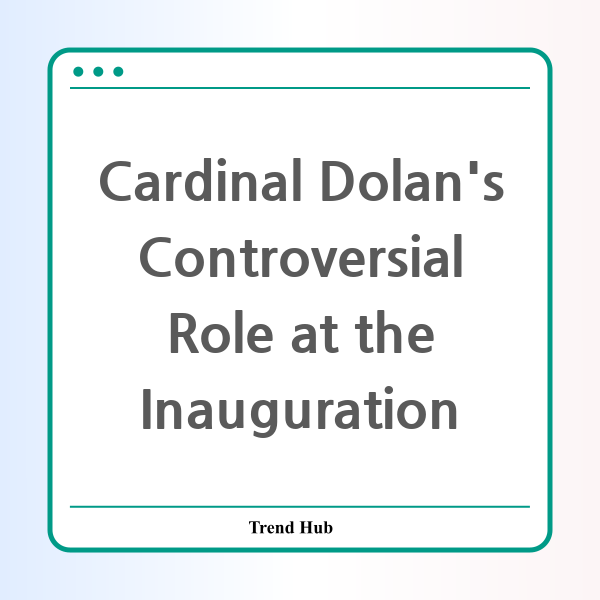* This website participates in the Amazon Affiliate Program and earns from qualifying purchases.

As the nation gears up for another presidential inauguration, a palpable divide is brewing among religious leaders regarding the participation of Cardinal Timothy Dolan and other clergy alongside President Trump. This moment presents an opportunity to reflect on the implications of their presence and the theological questions surrounding the Trump administration’s immigration policies. Will their prayers symbolize a tacit endorsement of mass deportation and the erosion of civil rights?
On Inauguration Day, the scene is set for a striking juxtaposition among clergy members. One group will be fervently praying for Trump and his administration, while another group will be praying earnestly that the policies enacted by the incoming president do not lead to suffering and harm for vulnerable populations. This scenario is not just a political spectacle; it underscores the profound spiritual and ethical dilemmas that religious leaders face in today's sociopolitical climate.
Cardinal Dolan, the Archbishop of New York, is expected to offer the invocation, while prominent evangelical leader Rev. Franklin Graham will also play a notable role during the ceremony. This raises critical questions about the position of these clergy members as proponents of Christian nationalism in a moment that may herald a rollback of civil rights achievements—particularly concerning immigration.
Historically, many religious leaders have played pivotal roles in advocating for social justice and civil rights. Dr. Martin Luther King Jr., whose birthday falls on the same day as the inauguration, is a powerful reminder of the church's potential to champion the marginalized. Yet, as some clergy stand alongside Trump, they may inadvertently align themselves with policies that threaten the rights and dignity of those they are called to protect.
Trump has made clear his intention to enforce strict immigration policies, which may include mass deportations, an issue that could profoundly affect many families across the nation. The administration's proposed changes hint at a future where even sanctuaries—traditionally safe spaces for the vulnerable—might be breached by enforcement actions. Clergy supporting Trump may soon find themselves confronted with a moral conflict: Will they prioritize their political allegiance or their religious duties to care for the less fortunate?
Moreover, the rhetoric surrounding immigrants has become increasingly divisive, with half of evangelicals viewing recent immigrants as an economic drain, while over a third perceive them as threats to public safety and traditional American values. The potential consequences of aligning with Trump’s agenda could lead clergy like Dolan and Graham into a precarious position, where their names become synonymous with the suffering provoked by mass deportation policies.
For clergy members who embrace the message and legacy of Dr. King, the inauguration stands not only as a day of celebration but also as a solemn reminder of the work that lies ahead. The New Sanctuary Movement, begun in 2007, exemplifies faith-based efforts to advocate for immigrant justice. This movement reminds us that faith and activism can coexist, challenging leaders to stand on the side of compassion rather than political expediency.
As we approach this momentous occasion, it is essential to consider the responsibility and influence of religious figures in shaping public discourse and policy. Cardinal Dolan, Rev. Graham, and others who support Trump are at a crossroads where their decisions could have far-reaching implications for countless individuals who seek refuge and hope in this country. The question remains: will they see their role as one that upholds justice, or one that endorses harm?
Ultimately, the prayers offered on Inauguration Day will echo far beyond the ceremony itself. How these leaders navigate the intersection of faith and politics will not only determine their legacy but also affect the lives of many Americans caught in the crosshairs of controversial immigration policies.
* This website participates in the Amazon Affiliate Program and earns from qualifying purchases.